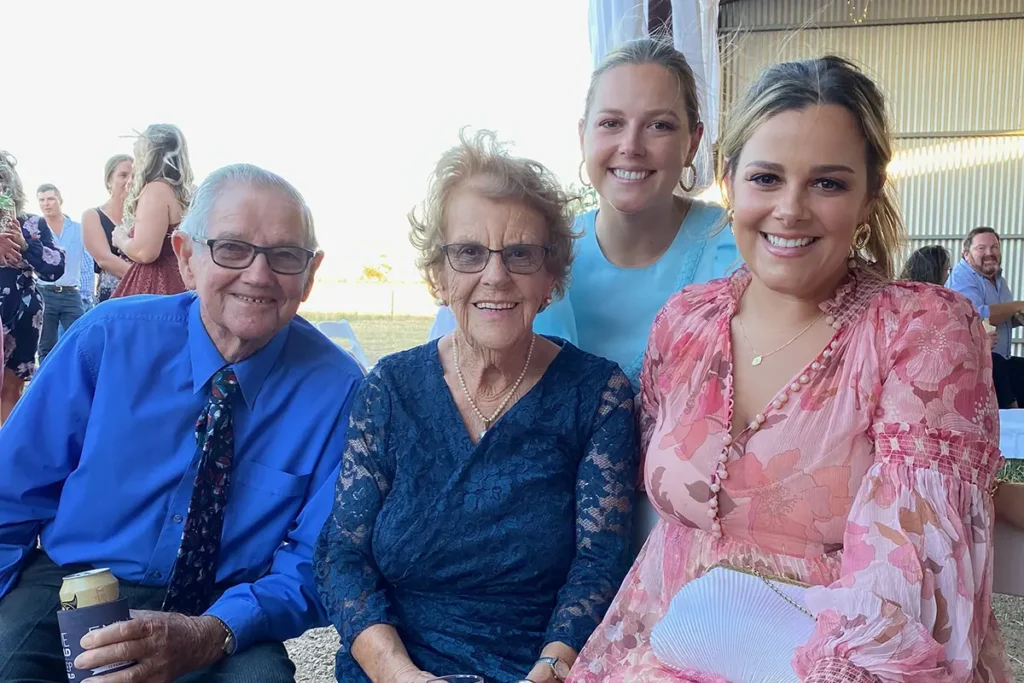Our mighty patriarch, my husband’s father died peacefully of old age at 94. None the less, it was a
very sad and distressing day for all that loved him. This wonderful generous kind and loving man
just suddenly wasn’t around anymore.

Our children, all young adults now and well past boarding school, had the great fortune of an
incredible relationship with their grandfather. As a farming family, our children had their
grandparents just up the road. All of their lives. A close, respectful, mentoring type of relationship.
When Harry died, not unexpected at his good age albeit suddenly, we needed to tell our daughter.
Amy is currently living on a very remote outback station in the Northern Territory. The following
week or two leading up to Harry’s funeral tossed up decisions and questions that got me thinking
about kids at boarding school. How do families stay the course through death and grief from afar.
As a parent of a boarding school child in Australia, you know that your child’s experience is
unique. They are away from home, learning to navigate independence while still relying on your
support and guidance. When a family member or close friend passes away, particularly someone
from your tight-knit rural community, it can be challenging to know how to best support your child
through their grief from afar.
Research from the Australian National University highlights the importance of open
communication and emotional support for children experiencing loss.1 For
boarding school students, this support may look a little different, but it is no less crucial.
First and foremost, acknowledge your child’s grief and validate their emotions. Children in small
rural communities often form special bonds with grandparents and family friends, as these
relationships are woven into the fabric of daily life. The loss of these influential figures can be
deeply felt, and it’s essential to create the warmth and safety for your child to express their
feelings openly.
When deciding whether to bring your child home immediately or visit them at school, consider
their individual needs and the circumstances surrounding the loss. In some cases, being
surrounded by the familiarity and routine of school can provide a sense of stability during a
difficult time. In others, the comfort of family and the opportunity to attend a funeral or memorial
service may be more beneficial. Have an open conversation with your child and their school to
determine the best course of action.
If your family lives overseas, the distance can compound the challenges of supporting your child
through grief. Make use of technology to stay connected, scheduling regular video calls to check
in and offer support. You might also consider reaching out to your child’s school or house
parents, who can provide on-the-ground support and keep you informed of your child’s wellbeing.
Grief is a highly individual experience, and there is no one-size-fits-all approach to supporting
your child. Some children may need more time and space to process their emotions, while others
may benefit from talking through their feelings regularly. Be patient, compassionate, and open to
adapting your support as needed.
In addition to your own support, encourage your child to lean into their boarding school friends
and community. Many schools have counselors, chaplains, or other support staff trained to help
students navigate grief and loss. Boarding schools also foster close-knit communities, and your
child’s friends and housemates can provide invaluable peer support during this time.
Finally, don’t forget to take care of yourself as you support your child. Grief can be emotionally
taxing, and it’s important to prioritize your own well-being. Consider reaching out to other
boarding school parents who may be navigating similar challenges, or access resources like the
Australian Boarding Schools Summit on the Boarding Expo 365 platform for guidance and
support.
Remember, supporting your boarding school child through grief is a process that requires
patience, understanding, and flexibility. By keeping communication open, acknowledging your
child’s emotions, and leveraging the support of their school community, you can help your child
navigate this difficult time and emerge with greater resilience and strength.
References:
1. Smith, J., et al. (2020). Supporting children through grief and loss: A guide for Australian families. Australian National University.
Share